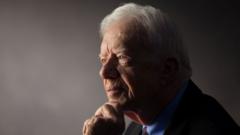In the span of forty-four years since Jimmy Carter's presidency, America has grappled with challenges that echo from the late 1970s into the present day. Carter navigated a period of economic strife and international tension, facing challenges that resonate today as President Joe Biden contends with a similar landscape of issues in 2024.
Carter's time in office was marked by a crisis of confidence among Americans, facing economic turbulence and international dilemmas, leading to significant apprehension at home. Fast forward to the current administration, and the issues remain remarkably similar: from economic struggles to pressing environmental concerns, and ongoing conflicts in regions like Afghanistan and the Middle East, the parallels are stark.
Carter's notable achievement, the Camp David Accords between Egypt and Israel, swiftly turned into a struggle following the Iranian hostage crisis, which defined his presidency and contributed to his defeat by Ronald Reagan in 1980. This episode mirrors Biden's own challenges, particularly the chaotic withdrawal from Afghanistan in 2021, casting a shadow over two decades of American involvement in nation-building and demonstrating the limitations of US power.
As Carter faced humiliation during the Soviet invasion of Afghanistan and the Olympics boycott that followed, Biden's administration has looked to counter Russia's aggression in Ukraine but now finds itself in a prolonged and bloody conflict, testing the resolve and unity of global allies.
Carter's achievements in foreign diplomacy bring forth the ongoing, unresolved Palestinian crisis, echoing in today's urgent humanitarian issues in Gaza. The complexity of regional politics continues to challenge America's role as an influential ally, reminiscent of the relationship Carter had with Israel and Egypt. Additionally, both presidents grappled with the emergence of powerful nations like China, which Carter paved the way for during his normalization of relations in 1979, leading to a complex rivalry that continues to evolve under Biden.
Domestically, both presidents contend with external crises spilling into internal concerns. The energy crisis of Carter's time pales in comparison to today's climate challenges, but many policy frameworks laid down during his presidency have been echoed in Biden's recent environmental initiatives.
Moreover, inflation has resurfaced as a critical concern. The spikes in consumer prices during Biden's presidency have alluded to the inflation crises that emerged during Carter's tenure, providing a stark comparison of economic management.
Both leaders also face a pervasive distrust in government, an issue Carter openly addressed in 1979. The lingering skepticism of authority remains a thorny issue in Biden's time, further complicating his efforts to address the nation’s needs.
In examining the trajectories of Carter and Biden, one sees striking similarities: both were underestimated political underdogs and faced formidable challenges not only to their policies but also to their popularity. The contemporary political landscape, rife with discontent and urgency, echoes the sentiments of earlier decades, continuing the cycle of governance fraught with trials.
Ultimately, the legacy of Jimmy Carter, shaped by introspection, humanitarian outreach, and a focus on diplomacy, brings valuable lessons to today's leadership as Biden navigates through a repetitive cycle of struggles that test the fabric of American governance and public trust. As these two presidencies illustrate, the dance of domestic and international affairs remains a perpetual challenge for leaders striving to build a more unified and resilient America.















